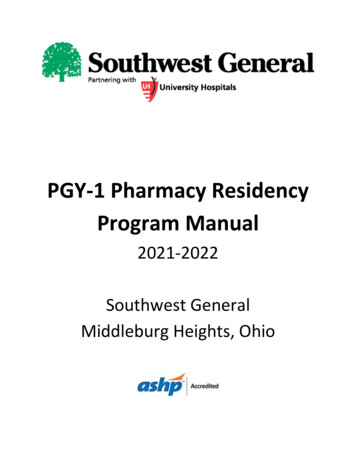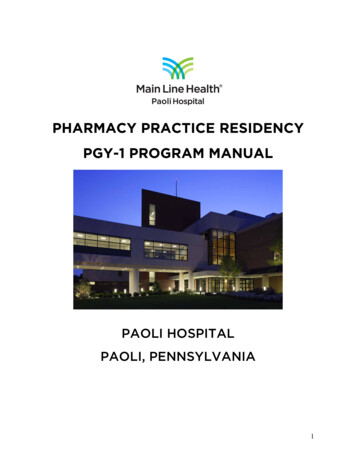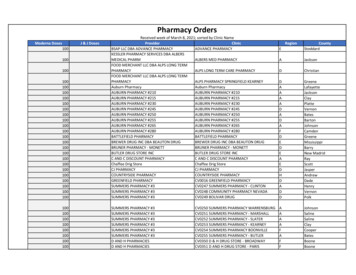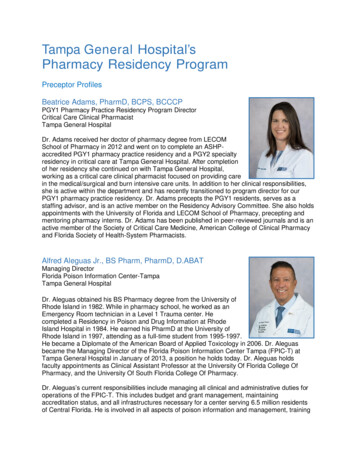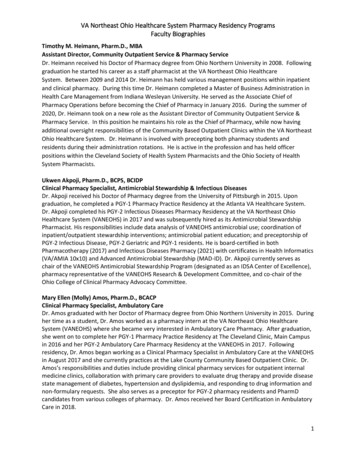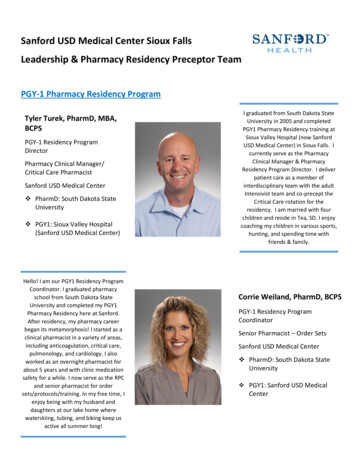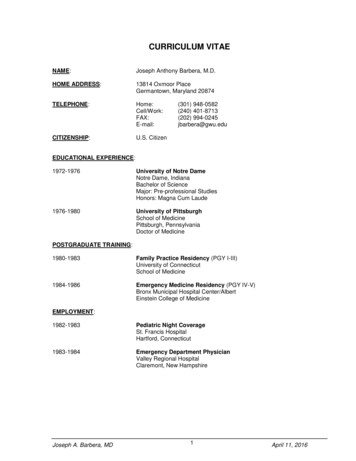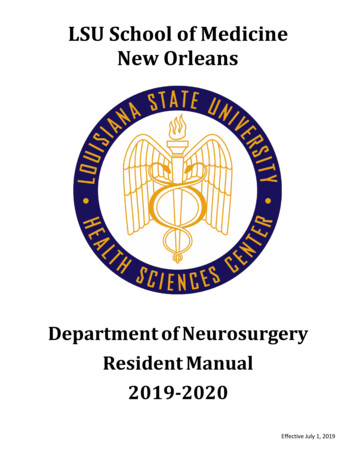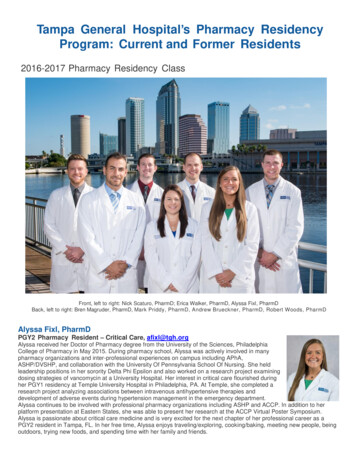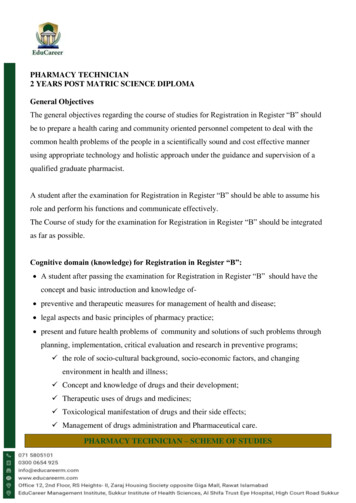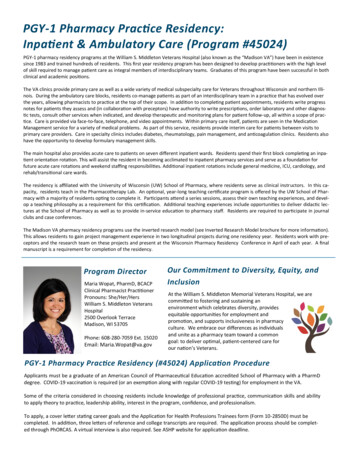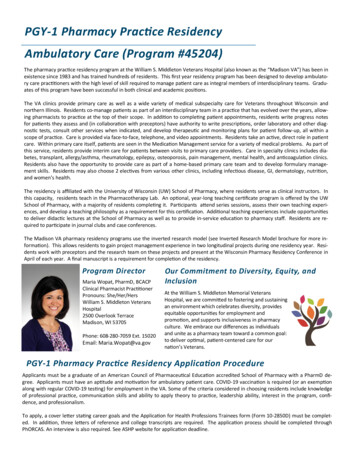
Transcription
PGY-1 Pharmacy Practice ResidencyPage 3Ambulatory Care (Program #45204)The pharmacy practice residency program at the William S. Middleton Veterans Hospital (also known as the “Madison VA”) has been inexistence since 1983 and has trained hundreds of residents. This first year residency program has been designed to develop ambulatory care practitioners with the high level of skill required to manage patient care as integral members of interdisciplinary teams. Graduates of this program have been successful in both clinical and academic positions.The VA clinics provide primary care as well as a wide variety of medical subspecialty care for Veterans throughout Wisconsin andnorthern Illinois. Residents co-manage patients as part of an interdisciplinary team in a practice that has evolved over the years, allowing pharmacists to practice at the top of their scope. In addition to completing patient appointments, residents write progress notesfor patients they assess and (in collaboration with preceptors) have authority to write prescriptions, order laboratory and other diagnostic tests, consult other services when indicated, and develop therapeutic and monitoring plans for patient follow-up, all within ascope of practice. Care is provided via face-to-face, telephone, and video appointments. Residents take an active, direct role in patientcare. Within primary care itself, patients are seen in the Medication Management service for a variety of medical problems. As part ofthis service, residents provide interim care for patients between visits to primary care providers. Care in specialty clinics includes diabetes, transplant, allergy/asthma, rheumatology, epilepsy, osteoporosis, pain management, mental health, and anticoagulation clinics.Residents also have the opportunity to provide care as part of a home-based primary care team and to develop formulary management skills. Residents may also choose 2 electives from various other clinics, including infectious disease, GI, dermatology, nutrition,and women’s health.The residency is affiliated with the University of Wisconsin (UW) School of Pharmacy, where residents serve as clinical instructors. Inthis capacity, residents teach in the Pharmacotherapy Lab. An optional, year-long teaching certificate program is offered by the UWSchool of Pharmacy, with a majority of residents completing it. Participants attend series sessions, assess their own teaching experiences, and develop a teaching philosophy as a requirement for this certification. Additional teaching experiences include opportunitiesto deliver didactic lectures at the School of Pharmacy as well as to provide in-service education to pharmacy staff. Residents are required to participate in journal clubs and case conferences.The Madison VA pharmacy residency programs use the inverted research model (see Inverted Research Model brochure for more information). This allows residents to gain project management experience in two longitudinal projects during one residency year. Residents work with preceptors and the research team on these projects and present at the Wisconsin Pharmacy Residency Conference inApril of each year. A final manuscript is a requirement for completion of the residency.Program DirectorMaria Wopat, PharmD, BCACPClinical Pharmacist PractitionerPronouns: She/Her/HersWilliam S. Middleton VeteransHospital2500 Overlook TerraceMadison, WI 53705Phone: 608-280-7059 Ext. 15020Email: Maria.Wopat@va.govOur Commitment to Diversity, Equity, andInclusionAt the William S. Middleton Memorial VeteransHospital, we are committed to fostering and sustainingan environment which celebrates diversity, providesequitable opportunities for employment andpromotion, and supports inclusiveness in pharmacyculture. We embrace our differences as individualsand unite as a pharmacy team toward a common goal:to deliver optimal, patient-centered care for ournation’s Veterans.PGY-1 Pharmacy Practice Residency Application ProcedureApplicants must be a graduate of an American Council of Pharmaceutical Education accredited School of Pharmacy with a PharmD degree. Applicants must have an aptitude and motivation for ambulatory patient care. COVID-19 vaccination is required (or an exemptionalong with regular COVID-19 testing) for employment in the VA. Some of the criteria considered in choosing residents include knowledgeof professional practice, communication skills and ability to apply theory to practice, leadership ability, interest in the program, confidence, and professionalism.To apply, a cover letter stating career goals and the Application for Health Professions Trainees form (Form 10-2850D) must be completed. In addition, three letters of reference and college transcripts are required. The application process should be completed throughPhORCAS. An interview is also required. See ASHP website for application deadline.
Required RotationsAmbulatory CarePGY-1 Pharmacy Practice Residency Rotation DescriptionsAllergy and Asthma – Residents are responsible for independently interviewing and monitoring patients with allergic rhinitis, sinusitis, and asthma. The resident obtains a medical history, symptom and disease history, performs a brief physical exam includingears, nose, throat and lung assessments, and monitors medication efficacy, safety, and adherence. The resident will learn to effectively evaluate spirometry results and symptoms to determine medication appropriateness and efficacy. An allergist oversees theclinic and staffs with the resident to provide optimal patient care.Anticoagulation – This clinic is pharmacist-managed and is responsible for managing all VA patients receiving warfarin and directoral anticoagulants (DOACs) from our hospital. The clinic provides care for over 700 Veterans. Residents conduct telephone visitsprimarily to assure safe and effective use of antithrombotic therapy. They also initiate therapy and participate in transitions of carefrom inpatient to outpatient. Residents also coordinate interruptions for procedures, using low molecular weight heparin if warranted. Residents are involved with patient education as needed.Diabetes – Patients with complicated and difficult to control diabetes are referred to this clinic. The clinic uses a multidisciplinary approach to the management of Type 1 and Type 2 Diabetes. Residents see patients in both a Pharmacistmanaged clinic and in a clinic staffed by both Pharmacist and Endocrinologist attendings. The resident is responsible forall aspects of diabetes-related care. The program is structured to provide the resident the opportunity to monitor thesafety and efficacy of drug therapy in ambulatory care settings, including medical record review, patient interview andtargeted physical assessment, interpretation of laboratory data, consultation with staff, and patient education toachieve optimal patient outcomes.Epilepsy Clinic – Residents evaluate patients with a wide range of seizure disorders. Residents will also gain experience evaluatingpatients with various psychiatric comorbid conditions including major depression, bipolar disorder, and anxiety. The resident isresponsible for obtaining a medical history, symptom and disease history, performing a short neurological exam, and monitoringanti-epileptic drug therapy for these patients. The resident works closely with a team consisting of a clinical pharmacy practitioner,nurse case manager, and an attending neurologist to provide optimal patient care. The resident is also responsible for assisting inprecepting fourth year pharmacy students who rotate through this clinic.Formulary Management – Residents are responsible for a variety of duties during this rotation, including education and guidanceof prescribing through electronic consults and ordering tools; review of non-formulary drug requests for appropriateness, safety,and cost effectiveness; monitoring medical center medication utilization to identify areas for improvement; management ofnational cost saving initiatives; working on formulary conversions; completing a medication use evaluation; and management ofthe adverse drug reaction program. Requirements for completion of this rotation include completion of one drug monograph, onemedication use evaluation, documentation of adverse drug reactions, clinical reviews pertaining to non-formulary or restrictedmedication requests, completion of new patient orientation notes, assisting with management of manufacturer back orders, PBM/FDA Patient Safety Alerts, and pharmacists clinical interventions. Residents may also be required to attend Madison P&T, regionalP&T, and regional PBM meetings during this rotation.Heart Failure – The Heart Failure (HF) Clinical Pharmacy Practitioner (CPP) serves as a provider within the MadisonVA multidisciplinary Cardiology service. Cardiology providers refer patients to the HF CPP for optimization ofguideline-directed medical therapy. Residents will provide care primarily through telephone encounters with inclinic encounters as appropriate. Residents will evaluate home vital data, pertinent labs, review of symptoms, andmedication tolerability to develop a plan for medication optimization. Residents will also provide education onhome monitoring and lifestyle factors for optimal HF self-management.Hypertension – Patients with renal disease and difficult to control hypertension are referred to this clinic. Because this clinic ishoused with the Renal service, residents work closely with a pharmacist preceptor as well as Renal attendings and fellows. Theresident will assess a patient’s blood pressure during telephone appointments primarily. Residents will evaluate pertinent labsand make medication adjustments as needed. Residents will also provide education on blood pressure monitoring and lifestylefactors that can contribute to hypertension.
Required RotationsAmbulatory CarePGY-1 Pharmacy Practice Residency Rotation DescriptionsHome-Based Primary Care (HBPC) – The HBPC team is an interdisciplinary team that provides team-based, patient-centered careto veterans. It is comprised of nurse case managers, nurse practitioners, occupational therapists, social workers, clinicalpsychologists, clinical dietitians, a clinical pharmacist, and a physician. Residents work closely with the clinical pharmacist toperform medication reviews, educate patients about their medications, monitor chronic disease states, and participate in homevisits for new and established patients.Medication Management – Residents manage care of chronic disease states for veterans by ordering andinterpreting labs and prescribing and adjusting medications. They are responsible for the education and follow-up oftheir patients; residents staff care plans with attending physicians or clinical pharmacists. Patients seen in this clinicare referred by their primary provider for co-management of chronic conditions including but not limited to hypertension, hyperlipidemia, diabetes, hypothyroidism, BPH, gout, and COPD.Mental Health – This rotation provides residents with a broad interdisciplinary experience. Residents gain experience inmedication management in a pharmacist-run clinic, including participation in our centralized intake system. Objectives includeexperiential learning of different DSM-IV axial diagnosis, clinical interview skills, psychopharmacology initiation, monitoring andevaluation, as well as completion of a mental health-related project.Osteoporosis – In this clinic, Veterans with osteoporosis or history of non-traumatic fractures areevaluated for secondary causes of osteoporosis and for management of their reduced bone density.Residents assess patients, order bone density studies and other tests needed to look for risk factors, andprovide and monitor bisphosphonates and other therapies.Outpatient Pharmacy – The Madison VA Outpatient pharmacy primarily dispenses medications to patients seen in clinic, the emergency room, and hospital discharges. Residents will gain experience at the counseling window where pharmacist medication consultation is completed as well as prescription processing. Other areas residents may be exposed to include finishing electronic prescriptions, verification station, controlled substance vault, and pharmacy telephone station.Pain Management – The Pain Management team is an interdisciplinary team comprised of a neurologist, rehabilitation medicinespecialist, nurse practitioner, clinical psychologist, and clinical pharmacist. Patients are referred to the clinic for chronic painmanagement with an emphasis on improvement of quality of life. Residents are responsible for reviewing patients’ painmedication histories prior to their first visit with the clinic and assisting with selection of appropriate medication treatment.Residents are also required to perform telephone follow-ups with patients following any changes in their pain medication regimen.Rheumatology – Patients with a wide variety of rheumatologic disorders are cared for in this clinic. Residents provide direct patient care including physical assessment and development of therapeutic and monitoring plans. Thesepatients are co-managed with a Pharmacist preceptor and Rheumatologist attending physicians.Tobacco Treatment – This is a clinic run by the pharmacy residents and a clinical pharmacist. Residents providetobacco cessation counseling and evidence-based medication therapy through group sessions and individual phonecounseling. Participation in group sessions may be through face-to-face meeting and video conference. This is afree service for Veterans.Transplant — This rotation will allow the resident to gain experience in managing pharmacotherapy for transplant patients, to develop independent judgment and accountability, and to improve the verbal and written communication skills necessary to be aneffective clinical pharmacy practitioner. Care delivery is by face-to-face and telephone encounters.
Elective RotationsAmbulatory CarePGY-1 Pharmacy Practice Residency Rotation DescriptionsCBOC Medication Management – This elective rotation has all the main components of Medication Management in Madison, butis completed at one of the rural community-based outpatient clinics (CBOC). This rotation will help you develop the skill setneeded to excel in within a rural primary care setting. You may select which CBOC you are most interested in. Car pooling withpreceptors is available.Dermatology – Residents work with attending dermatologists in addition to dermatology fellows and medical residents. Emphasisis placed on recognizing common dermatologic problems and their management.GI – The resident works with the clinical pharmacist in this clinic to co-manage patients with the gastroenterologyteam. This clinic is intended for the treatment and monitoring of Veterans with chronic viral hepatitis C, chronic viralhepatitis B, and advanced liver disease. Pharmacists operate under an independent scope of practice to start andadjust antiviral therapy. Pharmacists also provide education and monitoring for those enrolled in clinic.Infectious Disease/Home Infusion – The ID clinic serves as the primary care clinic for all HIV patients at the Madison VA. It is alsoa consult clinic for patients with severe or chronic infectious diseases. All patients on home IV antibiotics are followed by the IDclinic. Experiences during the rotation may include HIV, home infusion, diabetic or ischemic ulcers, wound care, and treatment ofconditions including osteomyelitis, endocarditis, and more.Mental Health – This rotation provides residents with an opportunity for an additional experience in mental health. Residentstravel to a VA clinic in Rockford, Illinois, to see patients in the mental health clinic at that site. Residents benefit from the guidanceof the Madison VA mental health pharmacy preceptor as well as the other mental health providers (including a nurse practitioner)based at the Rockford clinic.Nutrition – In this rotation, the resident works with a registered dietician, who sees patients for the dietary management of a variety of disease states, such as diabetes and heart failure, weight loss as an extension of the MOVE! program, prevention of additional weight loss, and pre– and post-bariatric surgery management. It is popular for residents interested in managing diabetes andlearning more about a diabetes-friendly diet and how to carb count.Oncology – The rotation is designed to develop the resident's ability to educate patients and caregivers on chemotherapy regimensand potential toxicities, recommend appropriate supportive care therapies, recognize and assess toxicities related to chemotherapy, and how to appropriately manage these toxicities. The resident will be responsible for assessing patients in the Hem/OncPharmD clinic which includes telephone and face to face visits (face to face visits are usually reserved for new patients initiatingchemotherapy). This includes assessing toxicities, laboratory values, and making recommendations for treatment adjustments. Theresident will also spend time in the infusion clinic working with the clinical pharmacist and infusion nurses.Physical Assessment – This rotation provides residents with hands-on experience and increased exposure to physical assessmentsin clinical practice. The resident will see patients with a primary care physician.Specialty – The purpose of this rotation is to provide the resident with experience in managing high cost and unique injectabletherapies, caring for patients with complex disease states receiving care from specialty clinics including but limited to Allergy, Dermatology, GI, and Rheumatology Clinic. Resident will complete assessment of pharmacotherapy for appropriateness, conduct laboratory monitoring, perform functional assessments, and provide medication counseling for both new and refill specialty medications. Care delivery is primarily by VA Video Connect and telephone encounters, with potential for face-to-face appointments aswell.Women’s Health – This elective rotation offers an opportunity for the resident to refresh knowledge and skills relatedto the female patient. Residents spend time observing and consulting with clinic providers.
Teaching OpportunitiesPage 7PGY-1 Pharmacy Practice Residency: Resident Teaching RolesTeaching ResponsibilitiesOne of the goals of the residency program is to provide residents with the opportunity to develop and improve theircommunication and teaching skills. As part of their residency appointment, Madison VA residents have an appointmentas Clinical Instructors at the UW School of Pharmacy. With this appointment, residents spend at least 4 weeks over thecourse of the year teaching in the Pharmacotherapy Laboratory at the School of Pharmacy. This course focuses onclinical application of various therapeutic topics and skills. The appointment also grants residents access to UWresources including the medical library. In addition, residents are involved in a number of ongoing teaching andin-service activities including the following: Residents provide in-services to hospital administrative personnel, nurses, pharmacy personnel, students, andproviders as assigned by rotation preceptors. Residents may help precept pharmacy students completing introductory and advanced pharmacy practiceexperiences at the VA hospital. Residents have an extensive role in precepting students through the hospital’s student internship program thatis designed for pharmacy students who have completed their second year of pharmacy school.Teaching Certificate Program with the University of WisconsinThe teaching certificate is a separate, voluntary program that complements the experiencesobtained in the Pharmacotherapy Laboratory. Residents are taught strategies to teach theadult learner, facilitate discussions, and design a lecture. As part of this program, residentstake turns presenting the course topics and facilitating discussions. In addition, guidance isprovided on the development of a teaching philosophy that must be submitted to receive acertificate. A certificate, signed by the Dean of the School of Pharmacy, will be presented tothe resident after successful completion of this program.Topics discussed in the Teaching Certificate Program include: Creating a lesson plan Creating abstracts & posters Facilitating classroomlearning Providing effectivefeedback Matching your teachingstyle to the learningenvironment Designing and implementingan effective rotationObjectives &outcomesMethods to assess studentlearning
Other Resident ActivitiesPGY-1 Pharmacy Practice Residency: Other ActivitiesResidency Research ProjectThe Madison VA pharmacy residency programs use the inverted research model,or IRM (see Inverted Research Model brochure found on the residency website formore information). In the IRM, incoming residents complete a project that hasalready progressed through background research, protocol development, and IRBapproval (if applicable).The Wisconsin Pharmacy ResidencyDuring the first half of the year, residents are involved in data collection, dataConference is held annually at the Mononaanalysis, presentation, and manuscript submission as they finish this project.Terrace in Madison, WI.During the second half of the year, residents start a project to be finished the nextresidency year, performing the background research, developing the protocol, andobtaining IRB approval (if applicable). This model allows residents to gain project management experience in two longitudinalprojects during one residency year. Residents work with preceptors and the research team on these projects and present at theWisconsin Pharmacy Residency Conference in April of each year, which is held in conjunction with the Pharmacy Society ofWisconsin’s Educational Conference.In-ServicesEach resident presents a minimum of two formal presentations during the year on a topic of the resident’s choosing.The purpose of the formal presentations is to improve the resident's ability to prepare for a formal presentation withhandouts, to provide an oral presentation to peers, to provide an opportunity for education for the other residents andstaff, and to increase the resident's familiarity with various types of literature associated with pharmacotherapy.Journal ClubsResidents are required to attend and participate in the Pharmacy Residency Journal Club. This activity is coordinatedby the Education and Research Coordinators. Residents present journal articles and support interactive discussions ofpresented articles. The Journal Club meets weekly during the residency year and is regularly attended by residents,pharmacists, and students.Case ConferencesResidents and preceptors meet once a month to discuss interesting patient cases, clinical pearls, ornew information learned during rotations. This activity is coordinated by the Education and ResearchCoordinators. Residents take turns preparing cases to present. These sessions provide an opportunityto learn with and from fellow residents and preceptors about interesting, challenging, or uniqueclinical questions.
The residency is affiliated with the University of Wisconsin (UW) School of Pharmacy, where residents serve as clinical instructors. In this capacity, residents teach in the Pharmacotherapy Lab. An optional, year-long teaching certificate program is offered by the UW School of Pharmacy, with a majority of residents completing it.
